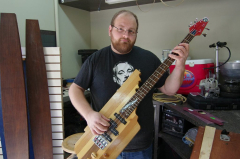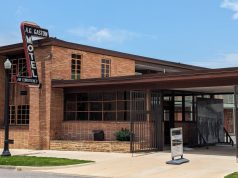

NASHVILLE, Tenn. (TSU News Service) – Growing up, Brian Allen would spend countless hours with his father in their small shop tinkering with electronics or learning the basics of wood-working tools. He loved working with his hands, and the Commercial Music major was soon rebuilding and refinishing drum sets and guitars.
It wasn’t long after Allen began playing bass guitar at Tennessee State University that the 23-year old decided he could build one of his own. And it wouldn’t be just any bass guitar. It would be one that incorporated his love of working with native woods of Tennessee.
It all started in high school when Allen’s band director gave him a set of drums to refinish. He completely removed the wrap from the shells, and refinished and stained the wood underneath.
“I enjoy the process of taking things apart to see if I can put them back together while improving them,” said Allen. “I love bringing back to life what other people discard using basic tools.”
A musician for the better part of 10 years, Allen plays percussion and bass guitar, and, he added, dabbles in beginner guitar. He soon made a decision to put his skills to the test and try to refinish his first guitar. Walking into the local Goodwill store, he left with a low-end 12-string Kay vintage acoustic guitar he purchased for $140 to see what he could do by “playing around with it.”
“It was difficult, to say the least,” Allen joked. “It was really harder than I thought to disassemble and put back together. The body was in pretty bad shape and a little warped.”
After sanding to bare wood, Allen set about building a new bridge out of Honduran rosewood, something that he had never done before but a skill that would come in handy for future projects. Allen estimates he has nearly 100 hours in the refinish, but it taught him the basics of guitar building and he was ready to tackle his next project. After learning basic repairs and building a lot of confidence, Allen decided to build his own bass guitar.
“I figured I could build on my skills and create something that no one else has ever built,” he said.
After much research and on the advice of a close friend, Allen decided he would pay homage to his home state by building the guitar out of the seven native woods of Tennessee (Red and White Oak, Poplar, Pine, Cherry, Black Walnut and Maple).
“My mom has a rocking chair that served as the inspiration for the body,” Allen said. “A friend suggested I use the same hard wood as the chair and build it in the shape of the state of Tennessee.”
The first design was drawn on a simple white board in his kitchen and quickly morphed into a more elaborate design. Using simple algebra, Allen and his friend, an engineering student also attending TSU, decided the length of the guitar should be 29 inches, proportional with the length of the state at 429 miles.
He cut the different woods into 1 3/8 inch strips, glued them together and cut to create the shape of the state. After multiple coats of a protective finish, he installed the neck he got from an old bass guitar. The build was finished after he installed the electronic components.
“This build really kept me on my toes,” he added. “It was both awesome and a little scary building the bass this being my first time attempting anything like this. The plans changed a few times, as we hit some snags along the way, but in the end I think it is a guitar that I can be very proud of.”
After two-and-a half months of work, the guitar, the only one built in the shape of the state of Tennessee to his knowledge, was ready to make its debut not only in the classroom, but also as his senior project. That is when people started to take notice of his creation, Allen said.
Dr. Mark Crawford, associate professor and coordinator of the commercial music program, helped grade the project, and remembers that put in the hands of a musician such as Allen, it was an exciting project because he had the tools to create something “awesome.” Like many artistic people, in addition to Allen’s musical abilities, Crawford said, he has other creative skills. In his case, it includes working with his hands.
“He has an innate ability to fix things or build things, all which require creative problem-solving skills,” said Crawford. “I was aware of this when Brian enrolled in his Senior Project course. He approached me with the novel idea of building a bass guitar in the shape of Tennessee, and I decided this would probably be the best kind of project for him. Once he finished the bass, he used it as he performed with the Commercial Music Ensemble. Through the groups’ travel, Allen’s guitar was seen in four different states, including audiences at the BB King Museum, Holiday World Theme Park, Nashville Sounds baseball games, Nashville Shores and other venues.”
Just as impressed was Dr. Bob Elliott, head of the Music Department, who thought the guitar was “an excellent example of a boutique build” and an indication of the type of work taking place in the Commercial Ensemble program.
“Brian has an excellent future ahead of him,” said Elliott. “Our program is designed to not only help the students learn how to play music but also how to find a niche in the music industry. Nashville is full of jobs that are not only in the music industry, but those that support it. Should Brian decide to pursue a career in instrument repair or the building of one-of-a kind instruments, his training at TSU and his musical background will serve him well.”
So what’s next for this budding guitar builder? Plans are already in the works for another bass guitar made out of Mexican Purple Heart wood with the neck fashioned from Madagascar rosewood. It will be, Allen said, one of the most exotic builds he has ever attempted.
But even more than building guitars, he is also looking forward to graduation this spring so he can start his career, either playing music or building guitars, or attending Luthier school for guitar building.
“My ultimate goal is to hopefully get on with a company such as Gibson, and learn guitar building from the ground up,” Allen said. “Then I’ll take what I’ve learned not only at TSU but whatever company I work at and turn that into possibly a custom-guitar building business or repair shop.”



